Portraits for a New Millennium
In the 1980s, while he experimented with neo-Cubist distortions in his paintings, Hockney continued to make traditional drawings as a means of looking inward. In the autumn of 1983, he produced a series of contemplative self-portraits in which he observed himself, as a middle-aged man, with honesty and vulnerability. “I just thought I’d look at myself. As I go deafer, I tend to retreat into myself, as deaf people do,” he explained. In another self-portrait series, executed in 1999, he adopted a more playful attitude in a range of facial expressions.
A few years later, Hockney turned to watercolor, a medium he had not explored since the 1960s. This new way of working freed up his approach, allowing him to draw quickly and directly on paper. He described these watercolors as “portraits for the new millennium,” convinced that, despite his experimentation with photography and other technologies, the human eye and hand were still the best tools for capturing the individuality of his sitters.
Artwork: © David Hockney
Self Portrait with Pen
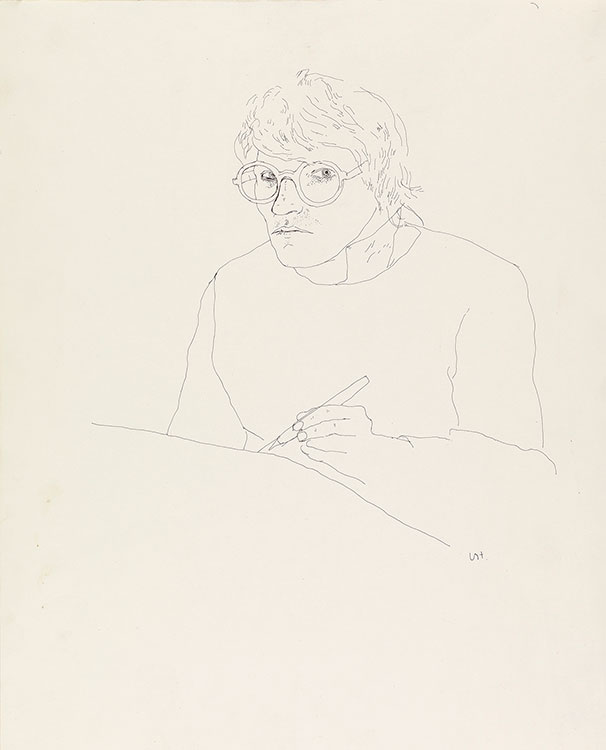
David Hockney
Self Portrait with Pen, 1969
Ink on paper
The David Hockney Foundation
© David Hockney
Photography by Richard Schmidt
Self Portrait, 1980

David Hockney
Self Portrait
1980
Lithograph
The David Hockney Foundation
© David Hockney / Gemini G.E.L.
Photography by Richard Schmidt
Self Portrait with Cigarette, 1983
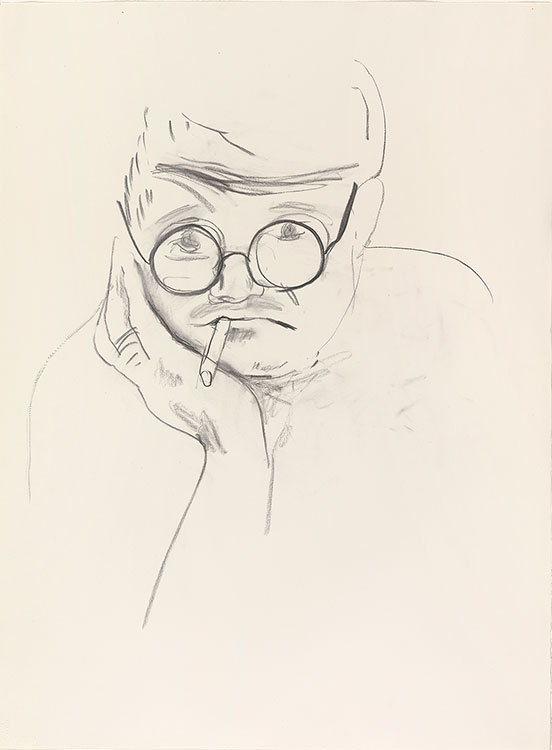
David Hockney
Self Portrait with Cigarette, 1983
Charcoal on paper
The David Hockney Foundation
© David Hockney
Photography by Richard Schmidt
Self-Portrait, 22nd Sept. 1983
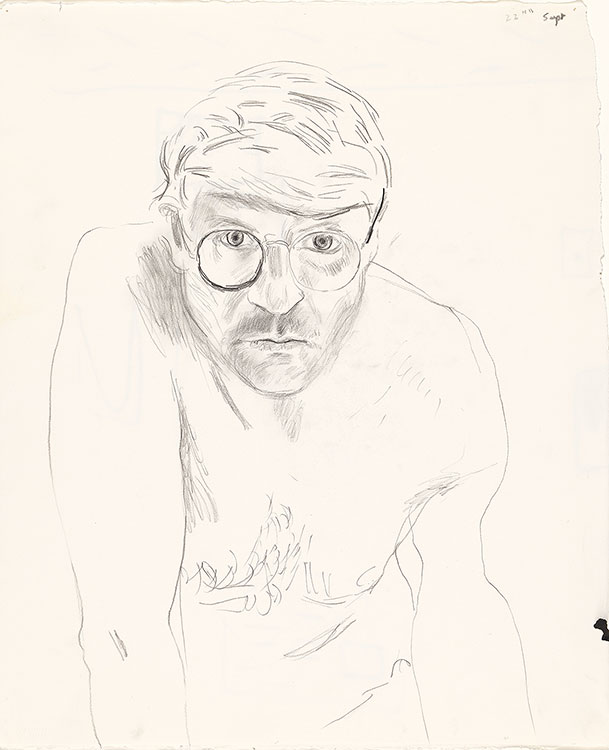
David Hockney
Self-Portrait, 22nd Sept. 1983, 1983
Charcoal on paper
The David Hockney Foundation
© David Hockney
Photography by Richard Schmidt
Self Portrait 26th Sept. 1983

David Hockney
Self Portrait 26th Sept. 1983, 1983
Charcoal on paper
The Doris and Donald Fisher Collection at the San Francisco Museum of Modern Art
© David Hockney
Self-Portrait, 30 Sept 1983

In the autumn of 1983, almost every day for two months, Hockney challenged himself to produce a candid self-portrait in charcoal. This period of intense self-reflection was, in part, a reaction to the untimely deaths of many of his friends due to the HIV/AIDS epidemic. The vulnerability exposed in these drawings is a far cry from the confident self-portraits of thirty years earlier. Like the pages of a diary, these works record daily changes in the artist’s moods and emotions.
David Hockney
Self-Portrait, 30 Sept 1983, 1983
Charcoal on paper
Collection National Portrait Gallery, London
© David Hockney
Photography by Fabrice Gibert
Man Looking for His Glasses
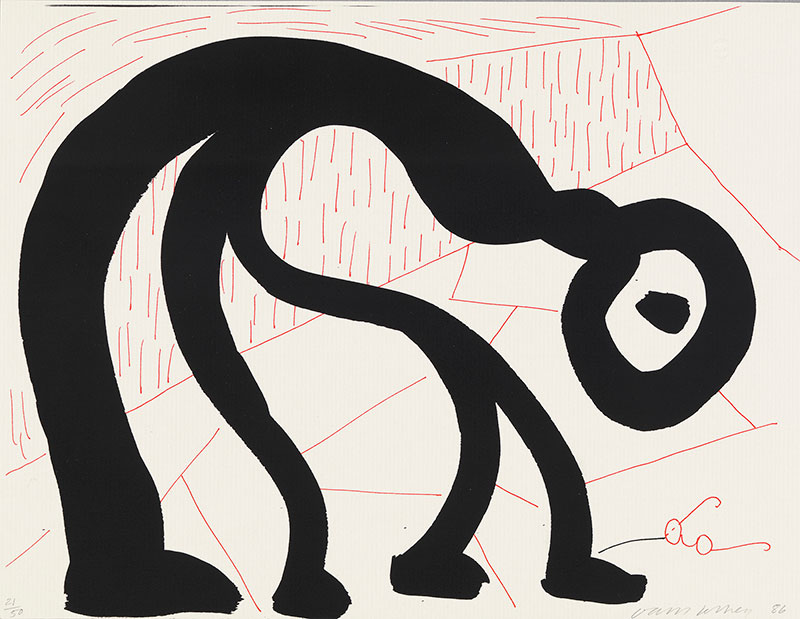
David Hockney
Man Looking for His Glasses, April, 1986, 1986
Homemade print
The David Hockney Foundation
© David Hockney
Photography by Richard Schmidt
Self-Portrait, July 1986
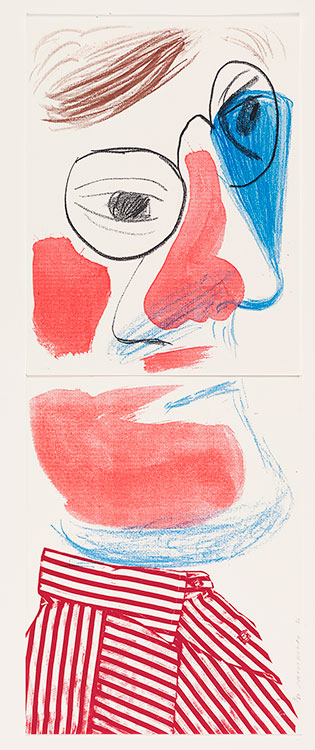
In 1986, while working on designs for a production of Wagner’s opera Tristan and Isolde, Hockney began experimenting with a color laser photocopier to produce what he called "home-made prints." Replicating the traditional printmaking process, he repeatedly fed a single sheet of paper through the copier until each color of the drawing had been printed. In this self-portrait, he even placed his own striped shirt on the glass plate of the copier. Though created with modern technology, the prints have a playful directness that reveals the artist’s hand.
David Hockney
Self-Portrait, July 1986, 1986
Homemade print on two sheets of paper
The David Hockney Foundation
© David Hockney
Photography by Richard Schmidt
Polaroid of Self-Portrait Drawing and Glasses (1–6)

David Hockney
Polaroid of Self-Portrait Drawing and Glasses (1–6), 1987
Polaroid
The David Hockney Foundation
© David Hockney
Self-Portrait, 1988

David Hockney
Self-Portrait, 1988
Crayon on sketchbook page
The David Hockney Foundation
© David Hockney
Photography by Richard Schmidt
Self-Portrait (Earthquake), Jan. 17, 1994

The inscription on this sheet explains the artist’s weary look. Hockney, who lived in Los Angeles at the time, drew this self-portrait on the day the powerful Northridge earthquake struck the San Fernando Valley, northwest of the city—one of the most devastating earthquakes in United States history.
David Hockney
Self-Portrait (Earthquake), Jan. 17, 1994, 1994
Crayon on paper
The David Hockney Foundation
© David Hockney
Photography by Richard Schmidt
Self-Portrait, London, 3rd June 1999

Hockney has always made candid self-portraits in moments of introspection, tracking his own aging process. These playful drawings in which he displays different facial expressions, influenced by Rembrandt’s self-portrait etchings, can be seen as precursors to the iPad self-portraits.
David Hockney
Self-Portrait, London, 3rd June 1999, 1999
Pencil on paper
The David Hockney Foundation
© David Hockney
Photography by Steve Oliver
Self-Portrait, Baden-Baden, 10th June 1999

David Hockney
Self-Portrait, Baden-Baden, 10th June 1999, 1999
Pencil on paper
The David Hockney Foundation
© David Hockney
Photography by Richard Schmidt
Self-Portrait, Baden-Baden, 10th June 1999
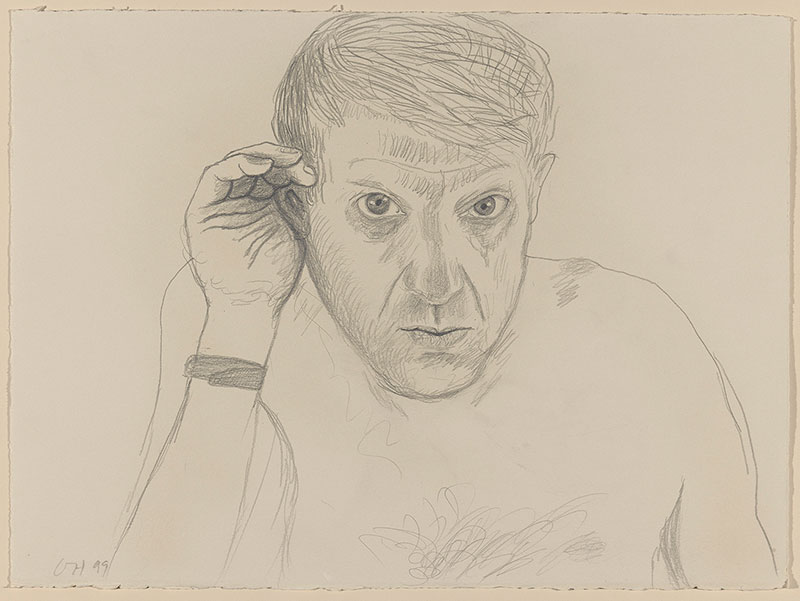
David Hockney
Self-Portrait, Baden-Baden, 10th June 1999, 1999
Pencil on paper
The David Hockney Foundation
© David Hockney
Photography by Richard Schmidt
Self-Portrait, March 2 2001

The presence of the mirror frame in this drawing recalls a typical composition of Renaissance portraits in which the sitter is shown beyond a window ledge. Inspired by the extensive research he was conducting at the time into old master methods—notably the use of lenses and mirrors—Hockney adopted here the classical bust-length pose that is found in portraiture throughout European art history.
David Hockney
Self-Portrait, March 2 2001, 2001
Charcoal on paper
Centre Pompidou, Paris. Musée national d’art moderne / Centre de création industrielle. Purchased 2002 [am2002-281]
Françoise and Jean Frémon, Paris
© David Hockney
Self-Portrait Using Three Mirrors
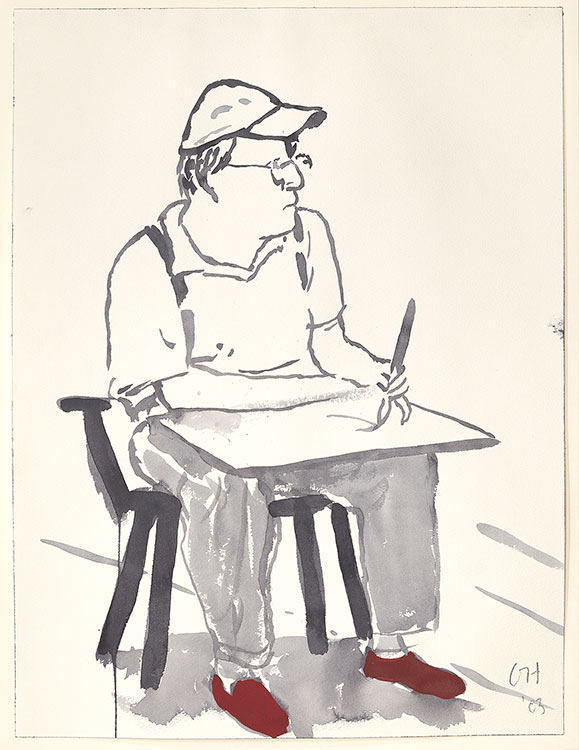
David Hockney
Self-Portrait Using Three Mirrors, 2003
Watercolor on paper
The David Hockney Foundation
© David Hockney
Photography by Richard Schmidt
'True Mirror' Self-Portrait II

David Hockney
‘True Mirror’ Self-Portrait III, 2003
Ink and watercolor on paper
The David Hockney Foundation
© David Hockney
Photography by Richard Schmidt
Self Portrait with Red Braces

David Hockney
Self Portrait with Red Braces, 2003
Watercolor on paper
Collection Gregory Evans
© David Hockney
Photography by Richard Schmidt
Self-Portrait, 17 Dec. 2012

David Hockney
Self-Portrait, 17 Dec. 2012, 2012
Charcoal on paper
The David Hockney Foundation
© David Hockney
Photography by Richard Schmidt
Recent Portraits of Gregory, Celia, and Maurice
In the spring of 2019, Hockney traveled to Amsterdam for the opening of Hockney – Van Gogh: The Joy of Nature, an exhibition at the Van Gogh Museum. While there, he fell in love with Rembrandt again. Later that year, with Rembrandt and Van Gogh on his mind, and spurred by the prospect of the present exhibition, Hockney invited Celia, Gregory, and Maurice to sit for a new drawing series. In these three-quarter-length portraits, he paid particular attention to faces and hands, often his starting point. Drawn in Los Angeles and Normandy, where Hockney had recently moved, the portraits are fond evocations of time spent together and represent the many familiar faces and expressions of his old friends. Using Japanese brushes with integral reservoirs and the walnut-brown ink favored by Rembrandt, Hockney achieved an uninterrupted line and built up the portraits in three different tones.
Gregory Evans I

David Hockney
Gregory Evans I, 27 June 2019, 2019
Ink on paper
Collection of the artist
© David Hockney
Photography by Richard Schmidt
Maurice Payne, 16th Dec 2019
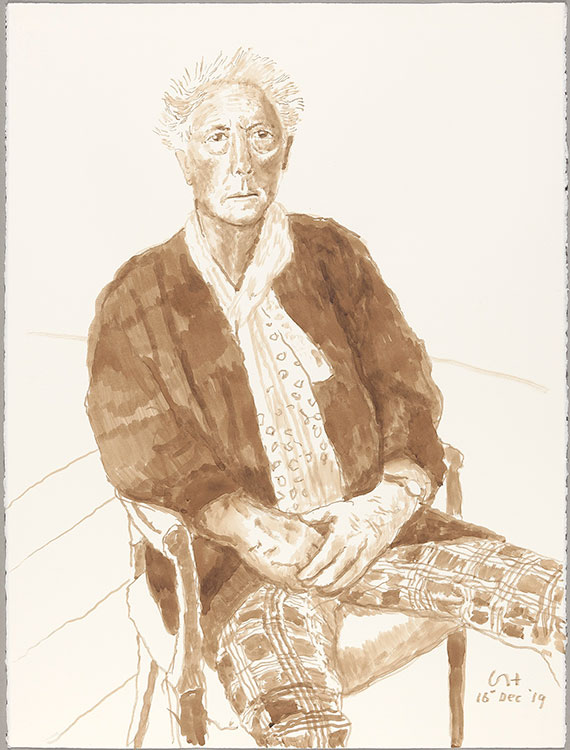
David Hockney
Maurice Payne, 16th Dec 2019,
Ink on paper
Collection of the artist
© David Hockney
Photography by Richard Schmidt
Gregory Evans II

David Hockney
Gregory Evans II, 27 June 2019, 2019
Ink on paper
Collection of the artist
© David Hockney
Photography by Richard Schmidt
Celia Birtwell
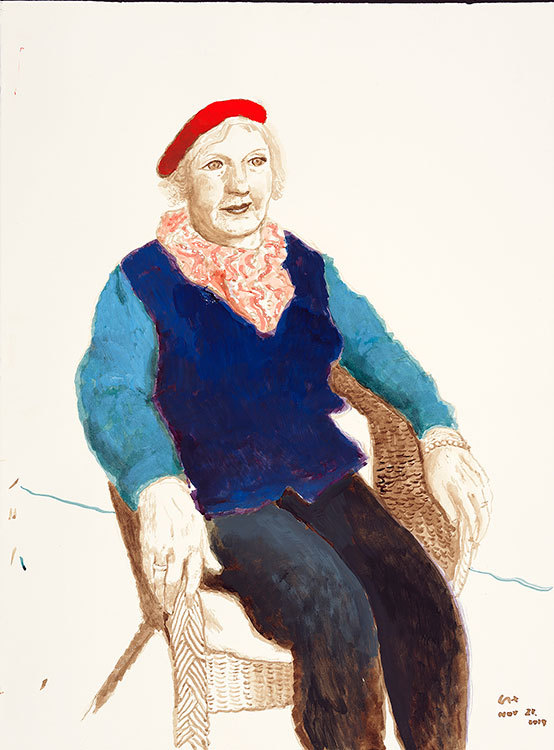
David Hockney
Celia Birtwell, Nov. 21 2019,
2019
Ink on paper
Collection of the artist
© David Hockney
Photography by Jonathan Wilkinson
Maurice Payne, 15 Dec 2019
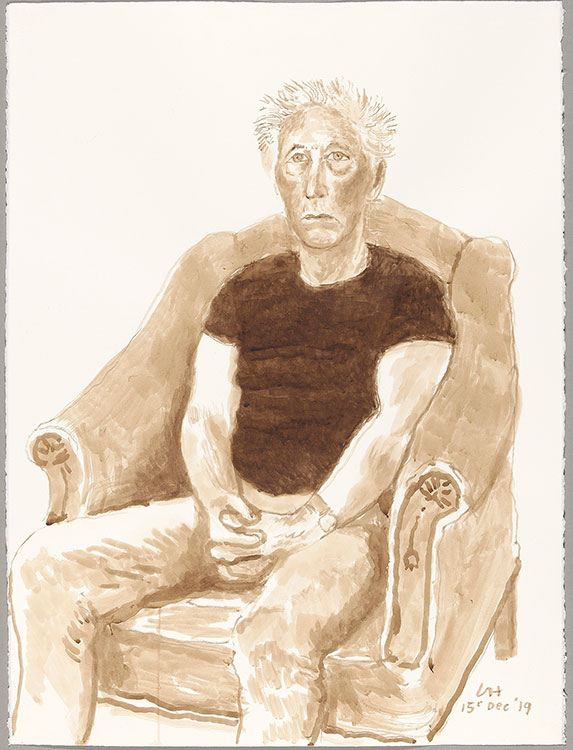
David Hockney
Maurice Payne, 15 Dec 2019, 2019
Ink on paper
Collection of the artist
© David Hockney
Photography by Richard Schmidt
